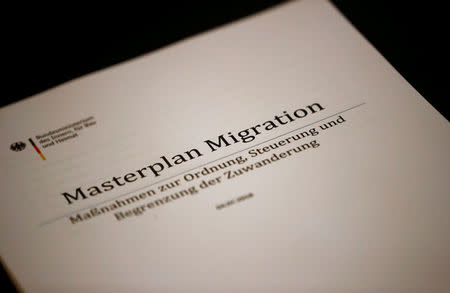Germany's Seehofer rejects blame for deportee's suicide after birthday boast
By Riham Alkousaa and Kirsti Knolle
BERLIN/INNSBRUCK, Austria (Reuters) - Germany's interior minister deflected blame on Wednesday for the suicide of an Afghan man among a group deported to Kabul, after opponents called for the immigration hardliner to resign for boasting that the deportations took place on his birthday.
The 23-year-old Afghan man was found dead in Kabul shortly after he was flown back. Afghanistan said he had lived in Germany for eight years, having arrived as a teenager.
He was one of 69 people flown by Germany to Afghanistan last week on interior minister Horst Seehofer's 69th birthday, an event which Seehofer had promoted at a news conference as evidence that he was increasing the pace of expulsions.
Seehofer, whose tough stance on immigration nearly brought down Angela Merkel's government last week, defended himself on Wednesday in Innsbruck, Austria at a migration summit with fellow hardline interior ministers from Austria and Italy.
He said local authorities in the city of Hamburg had put the man who killed himself on the deportation list
"The whole procedure is very regrettable," Seehofer said. "But you have to ask the Hamburg authorities why they suggested him." He refused to comment on his "birthday" remark, saying anything he said would be "misused".
Asked about calls for him to resign, he said: "I have nothing to say to that."
Seehofer is the leader of the CSU, a party which occupies the place of Merkel's conservative CDU in Bavaria, Germany's largest state. The two parties have been aligned almost without interruption since World War Two, but nearly fell out last week over Seehofer's tough line on immigration, potentially bringing down the government.
Gyde Jensen, a lawmaker for the pro-business Free Democrats and head of the parliamentary human rights committee, was one of many politicians who demanded Seehofer's dismissal.
"Anyone who celebrates 69 deportations for his 69th birthday is in the wrong job," she said in a statement.
At the Innsbruck summit, Seehofer was joined by Austria's Herbert Kickl and Italy's Matteo Salvini, both far right politicians who became interior ministers this year and have demanded tough policies on immigration.
Kickl said "terrible" events like the suicide could never be ruled out. "There's no model that lets you exclude somebody taking their own life out of despair."
REVERSAL
Last year, after a bombing in Kabul killed at least 80 people, Merkel said Germany would deport to Afghanistan only criminals and people it considers a threat. But Germany has since abandoned those restrictions based on a new assessment of security in Afghanistan, the interior ministry said.
Some 17 years after the Taliban were ousted by a U.S.-led campaign following the Sept. 11 attacks on the United States, security is fragile across much of Afghanistan and hundreds of civilians have been killed in attacks this year.
Politicians from all parties apart from Merkel's and Seehofer's conservative alliance and the far-right Alternative for Germany (AfD) called for Seehofer to quit.
"His resignation is overdue. Hello coalition?!?" tweeted lawmaker Kevin Kuehnert, leader of the youth wing of the Social Democrats, who are part of Merkel's coalition.
Refugee rights organisation Pro Asyl said 51 of the 69 deportees were booked on to the flight by the government of Bavaria, run by Seehofer's CSU.
Seehofer is fighting to hang on to the CSU party chairmanship as the CSU sinks in the polls, 10 years after he became leader. Bavarian Premier Markus Soeder is his main rival.
Some in the CSU see robust language as an effective way of challenging the AfD, which is gaining on the CSU in polls ahead of October's vote for a new Bavarian parliament.
At the summit, which continues on Thursday, Seehofer told reporters he was optimistic that a deal could be reached on returning to Italy refugees who had registered there.
(Additional reporting by James Mackenzie in Kabul, Joern Poltz in Innsbruck and Thomas Escritt in Berlin; Editing by Richard Balmforth)




